NEW ORLEANS
September 26, 2018
STRANGER: Jay Nix
LOCATION: Parkway Bakery & Tavern, 538 Hagan Avenue, New Orleans
THEME: Learning about the classic New Orleans poor boy sandwich
Jay Nix knows how to be a good manager: “Don’t be an asshole.”
The straight-talking owner of New Orleans’ landmark Parkway Bakery & Tavern, Jay is a wise-cracking 67-year-old with an endless stream of stories. His tales chart how the city native went from a career in home maintenance and real estate to head of a business that makes thousands of poor boy sandwiches a year. “We shoot them out faster than machine gun bullets,” he jokes.
He learned that treating his staff right is the best way to make a “happy sandwich” that his customers will love. Jay had no experience in the food industry before taking over Parkway in 2003, so it’s been a trial and error process until now. But he thinks he’s finally mastered it. “You have to treat your employees with respect, because whatever image they have of the owner, that’s the way they feel about the customer. So if they think I’m an asshole, they hate the customer too. And if you have an angry sandwich maker, your sandwich is angry. It might be hard to make that connection, but they’re going to miss the pickles, or put on too much mayo,” he says.
Jay and his team don’t make angry sandwiches. The happy sandwich they make is the poor boy, or as others call it “po’ boy,” and it’s French bread sliced opened, typically filled with oysters, shrimp, or roast beef. It’s served plain or “dressed,” which means adding lettuce, tomatoes, pickles and mayonnaise.

New Orleans lays claim to the creation of the poor boy sandwich. Local narrative has it that brothers Bennie and Clovis Martin — former streetcar conductors who ran a restaurant — served the sandwiches to conductors who were on strike. “They said, ‘What are we going to feed these poor boys? Here comes another poor boy,” Jay tells me. “And over time, if you want to call it disrespect to the conductors or the sandwich, it got abbreviated to po’ boy. But we decided to bring the correct name back.”
Although Jay used the term po’ boy when he reopened Parkway in the early aughts, he’s overhauled the signage throughout the building and online, so that it now uses the full formal term poor boy, in tribute to the expression the venue used when it first opened in 1911.
Jay, a sturdy man with short, dark blonde hair, vibrant blue eyes, and a deep, almost raspy voice, tells me the tavern’s history as we start a tour of it before sitting down for a poor boy lunch. Appearances are deceiving. From outside it looks like the restaurant takes up a small bungalow. Its bright yellow walls draw the eye in, the windows lined in a vibrant green and the shutters a burgundy red. The color scheme is intentional; red for ketchup, green for pickle, yellow for mustard. The theme continues throughout the premises. And what a huge place it is.

We start in the tavern. It’s small, could probably sit about 15 to 20 people comfortably, with a couple of tables dotted around the rectangular room. “The original space was just this,” he says, scanning the bustling room. “Back when Parkway opened, people didn’t come in to sit down.”
Then Jay gets a twinkle in his eye.
“You Catholic? Want to confess?” he says, gesturing toward some red curtains leading to another room. “That’s our confession booth,” he adds with a wink. He throws open the curtains to reveal several video poker machines, and starts laughing. “Confess your sins and lose your money.”
Then Jay walks me outside to a massive tent with row after row of picnic tables. They’re often full, he says, particularly on the weekends when the line stretches out the front door. From there I get to see the ins and outs of Parkway, and it’s impressive. It covers many thousand square feet and continues to expand, with massive walk-in coolers, a comfortable employee break room, clean and efficient kitchens with top-notch fixtures and fittings, tons of storage space, and even an upstairs apartment. I get disoriented with the many twists and turns, but Jay breezes through the place with ease, sharing a smile and a friendly word with his workers as we pass by.
There’s a dedicated room for storing and cutting the mounds of roast beef, which is put in the roaster at 9am every morning and taken out at 7am the next day before the process starts all over again. The room smells great, like Sunday dinner with hints of gravy lingering in the air.
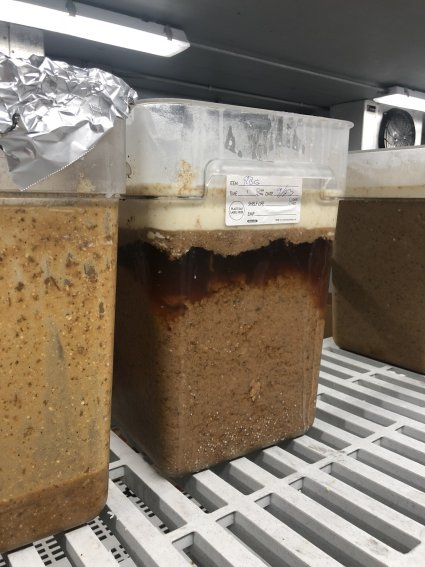
Speaking of the gravy, massive tubs of it are housed on shelves in the maze of storage rooms. When it chills, a large block of consolidated grease forms on top. If Parkway simply reheated the gravy, all that grease would blend in and ruin the taste. Instead, chilling the gravy lets the grease rise to the top and thicken, and it can be scooped off and sold — for example for cooks who need fat for making sausages. It leaves behind a simple sauce with a meaty flavor.
“Sometimes gravy is too spicy, or too watery, or too thick, or tastes too much like flour. We made our gravy through trial and error,” Jay tells me as we leave the gravy tubs behind and continue through yet more rooms. Parkway’s low-heat method of cooking its beef for so long hours means that the fat and connective tissues melts off during roasting, and it’s that liquid that forms the bedrock of the gravy drizzled over poor boys. “So the meat shrinks but the gravy grows.”
When talking to locals in New Orleans, there’s always a chance that conversation comes back to 2005’s Hurricane Katrina, or “the storm” as Jay calls it. And sure enough, as we’re navigating Parkway he shows me where the flood waters came six feet high. Parkway was open for just 18 months when the devastation wiped everything out. As Jay will tell me later, he was initially reluctant to reopen but once he and his family settled on it, they did so within 90 days.
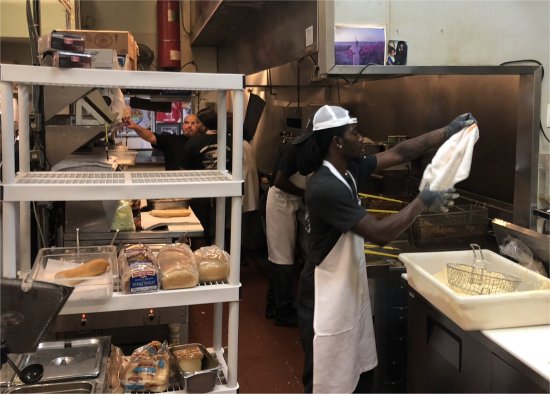
And Katrina brought its own strange blessing in disguise. Because Jay had no restaurant experience, he didn’t know how to organize a kitchen and since opening in 2003 had the wrong equipment in the wrong places. It created confusion in the kitchen. “We were tumbling over each other just trying to get sandwiches out,” he says. He was able to use his flooding insurance money to buy all-new equipment and this time place it right for a smoother behind-the-scenes operation. “We went from running around like chickens with their heads cut off to shooting them out like machine gun bullets,” he jokes for the second time, but his warm and easygoing personality makes it impossible not to laugh again. He’s the boss many would love to have; funny but stern, a likable leader.
The modern Parkway kitchen is immaculately clean, the handful of staff humming along as they churn out poor boy after poor boy, with ingredients from ham to fried oysters and shrimp, and from alligator sausage to meatballs or roast beef. It’s quiet in the kitchen, but everyone I make eye contact with flashes a genuine smile. It’s also modern, with touch screens to help process orders.
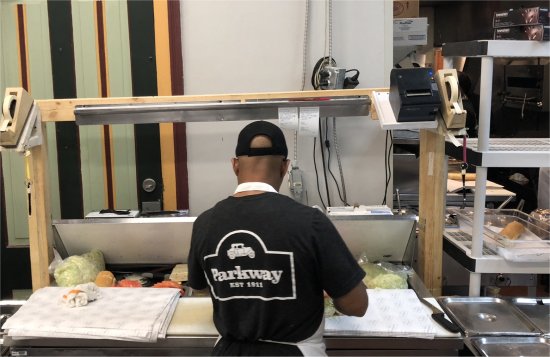
Depending on the day, the kitchen produces hundreds or thousands of sandwiches, with each ticket averaging about $20. Jay says Parkway will probably hit close to $5 million in sales this year. “An incredible amount of poor boys.” On weekends the line out the door is so long that sometimes the phone rings off the hook because nobody is available to answer it. If there’s a lull, it’s on weekdays between 2pm and 6pm, and then it picks up again till closing at 10pm.
Jay, who tells me a couple of times “I like a change and a challenge,” says he’s tinkering with the kitchen to make it easier to pick up the phone. Parkway is close to opening a dedicated takeout window that will have its own computer to assist with quick ordering.
Every piece of bread at Parkway gets toasted and the venue has large devices for this purpose, and they’re used so heavily that they have to be replaced every two to three years. Jay and his family members that run the place keep backup or old machines on hand in case of emergencies — one year the fryers went down, so they hauled in backups. Service was down for only 20 minutes.
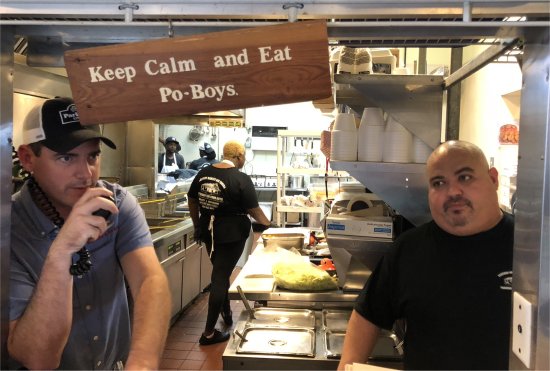
As we’re standing in the kitchen watching the cooks fill orders, Jay tells me more about preparing the meat for the restaurant’s signature roast beef sandwich. One way to roast beef is take the chuck and slice openings, putting cloves of garlic in there that melt into the meat during cooking. “We don’t do that,” he says. “We just let the chuck roast speak for itself. You won’t taste a lot of onions or garlic or salt or pepper or hot sauce, it’s just pure meat. And we got it right.”
He says it’s the same style of roast beef that Parkway’s customers loved before it shuttered in 1993. Jay purchased the property in 1995 before its eventual reopening in 2003. “We had to get the roast beef right because the first customer we got, I asked, ‘What kind of poor boy do you want?’ and he said, ‘What do you think, stupid? I want roast beef. This is Parkway Bakery ain’t it?”
Jay says the flavor of the roast beef at Parkway evokes Sunday dinners from his childhood, featuring roast beef, mashed potatoes, green peas, rice, string beans and rolls. “You can almost salivate that taste from 50 years ago,” he says, licking his lips. “So when we opened here, my sisters and I started cooking roast beef and on about the sixth one we said that’s it, that’s momma’s roast beef.”
But the real secret is the gravy he showed me earlier. “Everybody swears I have the Parkway recipe, but really anybody can cook the meat. It’s the gravy that nobody but us can get right.”
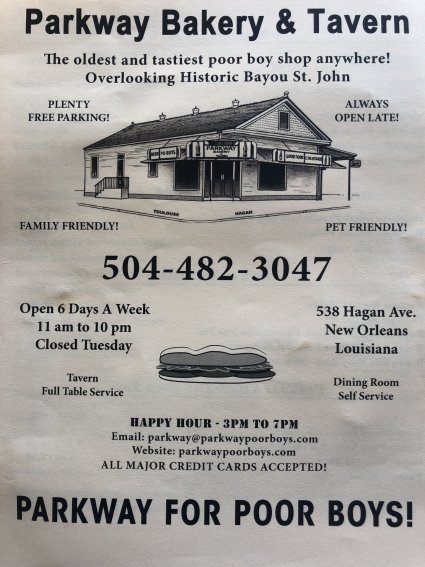
We watch as the kitchen “dresses” a few poor boys with the standard toppings of lettuce, tomatoes, pickles and mayonnaise. Jay shares that it’s possible to customize a poor boy to whatever one’s tastes might desire. Try adding horseradish, or Swiss cheese, or ham. Or just have it plain. “Doctor it up any way you want. There’s no right way to get it,” he says. “Plain roast beef is also good because you get the pure meat, the flavor doesn’t get confused with the dressing.”
The tour is making me hungry. So my stomach growls in approval and my eyes widen in greed as Jay asks for my order and says it’s time to sit down, eat, and talk some more.
I pick a 10 inch roast beef poor boy with just gravy for dressing, wanting the authentic experience I’ve been hearing so much about. Jay does a more modest 5 inch, with Swiss.
While waiting for our lunch, Jay tells me that he knew of Parkway from his youth because he was born and raised in New Orleans. “I never really left till I met my wife Sandra and we started traveling,” he says, then gestures over to her as she comes to say hello.
We chat and she tells me about how Parkway “was one of my dad’s stomping grounds, we’d go with him whenever he got sandwiches, and this was one of his spots.”
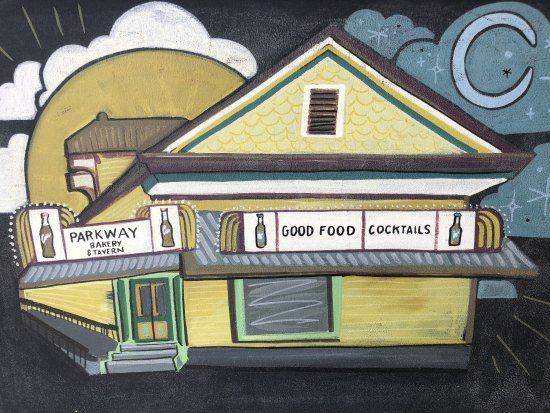
It’s a family affair at Parkway, and after a while Sandra returns to work while Jay continues his story. His mother died when he was 12, and he went to boarding school because his physician father had such long and late hours that he couldn’t look after his children. After school, Jay “bounced around three of four colleges for one or two years.”
What did he study? He laughs. “I studied alcohol.”
Jay says he’s always been the inquisitive hands-on kind, tinkering with things at home like taking the door locks off just to see how they worked. So he got a two-year social degree in motor vehicle technology, and started out with a career as an auto mechanic in the 1970s. “The money was good but at 19 years old I couldn’t keep my hands clean. Do you know what a mechanic’s hands look like?” he says with a wince, talking about the grease and grime.
So he quit the auto trade and went into carpentry. “Sawdust is forgiving, you can wash it off and then your hands look good enough to pat your girl on the cheek,” he says playfully.
From carpentry he moved more generally into home repairs, going around doing small and large odd jobs at houses, everything from fixing squeaky floorboards to repairing window panes. He started out on properties that his grandmother owned, then worked for a man who had more than 1,000 rentals. Eventually he decided to be his own boss in the same line of work when his prior boss “overextended himself” and had to sell a number of his rentals. Jay decided to buy up some of the properties, and the house that sits next door to Parkway was one of them.
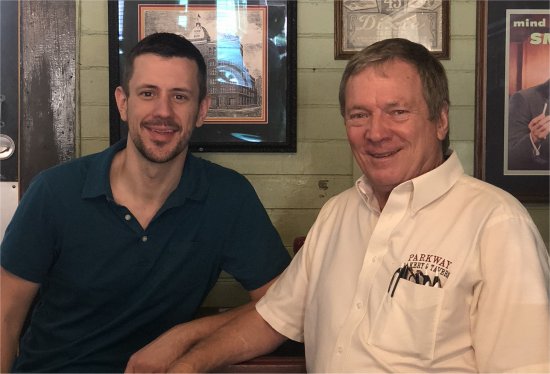
Jay didn’t originally intend to own the Parkway premises. But after doing a major renovation on the house next door, he worried about who might buy the Parkway building. “I was thinking, oh god, it could be an all night liquor store or anything ugly. So I thought maybe I could buy it to protect this,” he says, referring to Parkway as the “it” and the house as “this.”
He sat on the Parkway building for about 10 years, using it primarily as his tool shed. But people who remembered the old poor boy shop found out he owned it and kept asking when he would bring it back. “I had no intention of opening a restaurant and bar,” Jay says. “But after 10 years of them prodding, I got up enough money and enough nerve and enough time to do it. I figured I’d eaten in tons of restaurants and been in a million bars, so I can open a bar and restaurant. Not!”
Jay laughs, gesturing around the seating area. “It has nothing to do with this side of the counter,” because being a customer teaches nothing about owning a restaurant, he warns.
Still, he liked the idea of a fresh career and a new challenge. His repairs business wasn’t making a lot of money, so he decided to give it away and try reopening Parkway. “I like a change and a challenge,” he reminds me. “I went from cutting two by fours to cutting French bread.”

Before Jay could open Parkway, he ran out of money. So he had to sell his properties, including the house next door to the Bakery & Tavern. He’d gone from buying “that” shuttered restaurant to “save” his house, to selling his house to guarantee his ability to reopen Parkway.
Having no restaurant experience meant that starting out was trial and error, often with error. He’d craft his own devices to fix machinery, only to go to a hardware store and find 40 similar-looking but professional tools on the shelf. And he recalls buying inferior equipment at the outset.
Even smaller-scale problems persisted until he and his family came up with solutions. The restaurant gets through a lot of mayonnaise, and they found the quickest way to get it on to sandwiches was to fill quart-sized plastic bottles of the stuff and keep them refrigerated until use. But the bottles were a devil to clean and refill. Then one day someone suggested using a dip to get the mayonnaise out its original container and daub it onto sandwiches like a paint brush. The streamlining plan was a success. “That evening we burned all the bottles in celebration.”
Perhaps the greatest skill Jay says he learned was how to be a good boss. In the beginning, a consultant advised him to never pay employees more than $6 an hour or risk going out of business within three months. He took the consultant at her word for many years. “And you know what I had? 50 angry employees, and they weren’t productive.”
So he tried something different, adopting the mantra of not being an asshole. He bumped up employees’ wages to anything from $10 to $30 an hour. “Now I have 25 percent less employees, but better productivity and the payroll’s the same,” he says. The consultant “was probably right in the start, but it hurt us in the long run. You just learn these things.”

One thing he knew was that he had to get the roast beef poor boy right, because Parkway during its original run had developed a reputation for making those sandwiches particularly well. Once the recipe was perfected, it was time to open the doors. There was a queue from opening day, which Jay and other family members credit with the local nostalgia for the place.
Then came Katrina. Parkway suffered extensive water damage. When Jay returned to survey the place, he saw now-broken freezers stacked with rotten mounds of food. He was distraught, spending most of his days hidden away in the post-hurricane trailer provided by the Federal Emergency Management Agency. His passion for Parkway had evaporated.
Jay’s sister Eileen, the office manager, stops by to share “the reason we are here today” after Katrina. Jay’s nephew Justin, a tall and energetic, youthful man, joins Eileen as they tell me what brought Parkway back from the brink. Justin had been at college and wanted to see how bad the damage was. Something about Parkway stuck with him, and he decided to ditch college and instead start shoveling out the freezers and trying to clean up the place.
With tears, Eileen continues the story, “After a hurricane it’s hot, hot, hot, there’s no air at night, and we had no electricity, but Justin is out there by himself for three days. Jay would stay in his trailer and peek out, but then he started feeling guilty. So he went to help for him a little.”
“Then I said, ‘Let’s do it, I think it can happen!’” says Jay, finishing the memory. The uncle and nephew took charge on renovating the place, reopening Parkway for good in December 2005.

Justin, who was born and raised in Biloxi, Mississippi, says that despite his initial thought about getting a college degree, “Parkway had plans for me. I remember the first day we opened up after the storm, all the old timers were there. This place is special. I fell in love with it.”
With a smile similar to his uncle’s, he adds, “Never in my wildest dreams did I imagine me and my family making a living like we are in my uncle’s old tool shed.”
Jay praises the integration of Parkway, saying it’s a place where a guy in a $500 suit can sit and chat and eat with someone who can barely afford a sandwich. “You go to fancy restaurants, the only people you see there can afford it. You go to the inner city, the people going to the highfalutin places ain’t going there. But a poor boy shop, everybody comes here.”
I’m one of those people passing through Parkway, and I have nothing but praise for the massive roast beef poor boy. The savory, succulent meat overflows from the sandwich, wetting the thick and fresh French bread with flavor but without making it a soggy mess. I put away the whole thing and a side of potato fries in one sitting, much to Jay and Justin’s amusement.
Our interview is almost over, although I could happily stay in the Nix family’s company for several more hours. They’re just that warm, welcoming and gracious. “Did we roll out the red carpet for you?” Jay asks as I start to gather my things. They did.
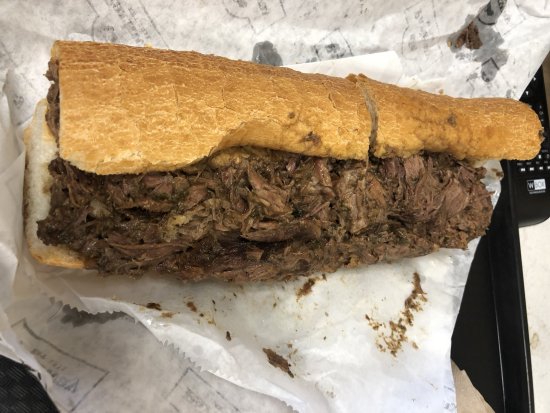
And yet there’s one question I feel he still needs to explain. Why “poor boy” and not “po’ boy”? It’s a dispute that rages even between my friends down in the Big Easy. At the start of the tour, Jay told me it was to bring the “correct” name back out of respect for the sandwich’s inventors.
He elaborates as the interview winds up. “When we opened, I knew I had to get the name right. If I called it Jay’s Poor Boy Shop, nobody would come. People came back because the Parkway had been dead for 10 years, and people wanted to remember something from their hometown,” he says.
“Now, if you didn’t know any better, Parkway Bakery & Tavern is confusing. That name’s a little out there, right? We’ve had people call asking for wedding cakes. Well we don’t make those, we make sandwiches. And Tavern? It’s not a big bar. So the name doesn’t make any sense. But because it doesn’t make any sense, it’s catchy, you remember it,” he explains. They needed to advertise what they actually make, and so the slogan was born: “Parkway for Poor Boys.”
“We call it true to what it was when it first opened,” Jay says with pride, then he chuckles. “But I almost needed speech therapy, because up till I was 50 I called them po’ boys.”
Parkway and its poor boys has caught the attention of national and international media, and it’s easy to find stories about Jay and his family and the restaurant online. It also caught the attention of former President Barack Obama, his wife, and daughters, who stopped by in August 2010 for lunch on the fifth anniversary of Katrina. Their visit was a massive boon for business, says Jay, and it even changed the ranking of most popular sandwiches. Before the Obamas’ visit, the most popular was roast beef. But then the president ordered a shrimp poor boy, and now that’s the most in-demand, followed closely by roast beef. Diners can even order a surf and turf option.
But as Jay told me when we first met, and recalls when he walks me outside his wonderful place, there’s no right or wrong way to fill a poor boy. Call it by its formal name, or call it by its abbreviated name, Jay says a poor boy is something simple: “It’s comfort food at its best.”
g3im4j
f33n6z
scm03c